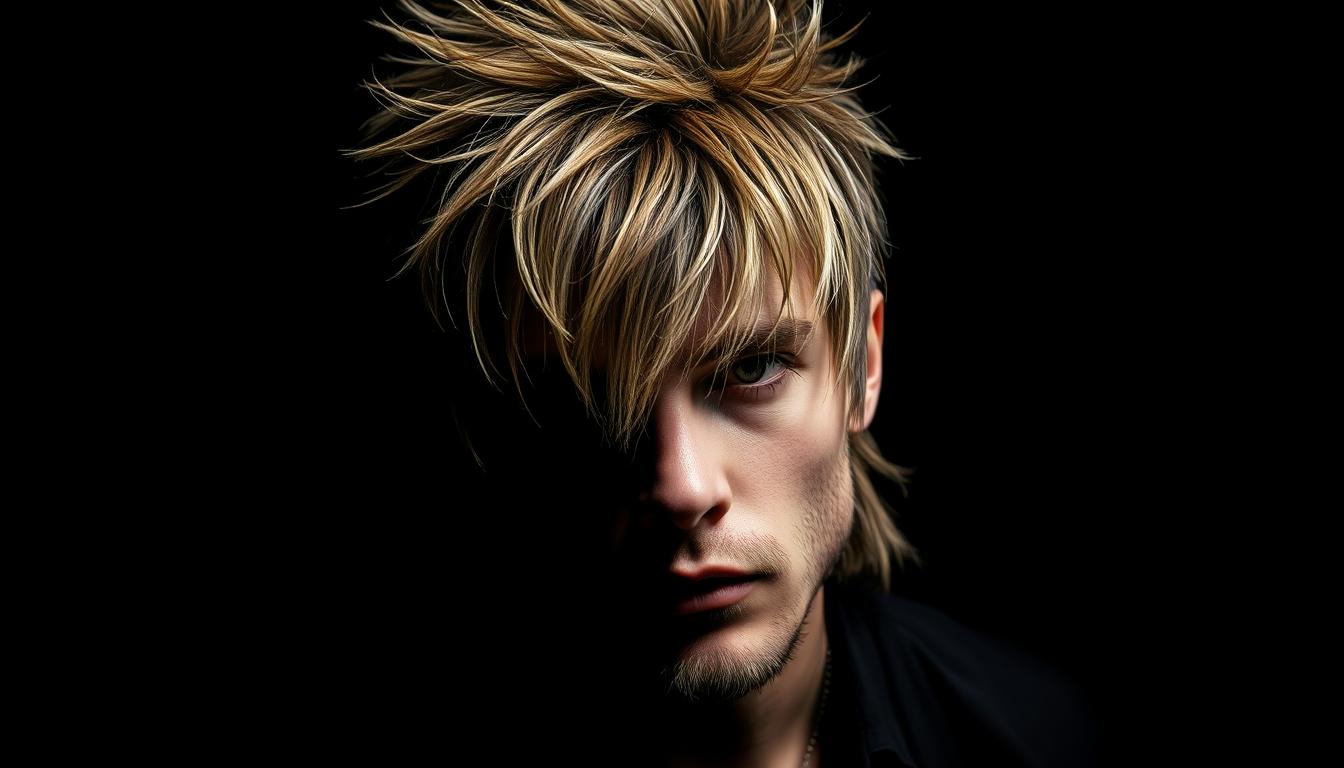
What if your next haircut could redefine your entire look? The beauty world is buzzing with a daring trend that blends wild texture with modern flair—and it’s not for the faint of heart.
Born in South Korea and amplified by TikTok, this rebellious hairstyle has exploded globally. Searches have doubled since 2020, while Pinterest users can’t stop saving inspiration boards. With over 80 million TikTok videos tagged #wolfcut, it’s clear this isn’t just another passing fad.
Why does this style resonate so deeply? It’s more than hair—it’s armor for self-expression. Women nationwide are embracing bold shapes that frame faces like art, creating looks that feel both retro and futuristic. The magic lies in customized layers: shaggy volume up top tapering into softer ends.
But here’s the real question: Does this edgy cut work for your lifestyle? We’ll break down everything from daily styling tricks to salon consultation tips. Whether you crave subtle texture or head-turning drama, your perfect match awaits.
Key Takeaways
- This hybrid hairstyle combines 70s mullet vibes with modern shag layers
- Works best with medium to thick hair types for maximum volume
- Low-maintenance styling with minimal product required
- Customizable for both subtle and dramatic interpretations
- Celebrity-approved by trendsetters like Billie Eilish and Miley Cyrus
Introduction to the Edgy World of Haircuts
Hair has always been a canvas for rebellion and identity. Long before TikTok tutorials, ancient warriors used their haircuts to intimidate enemies. Homer’s Iliad describes 8th-century BC fighters with cropped forelocks and flowing backs—a look that’s strikingly similar to today’s layered styles.
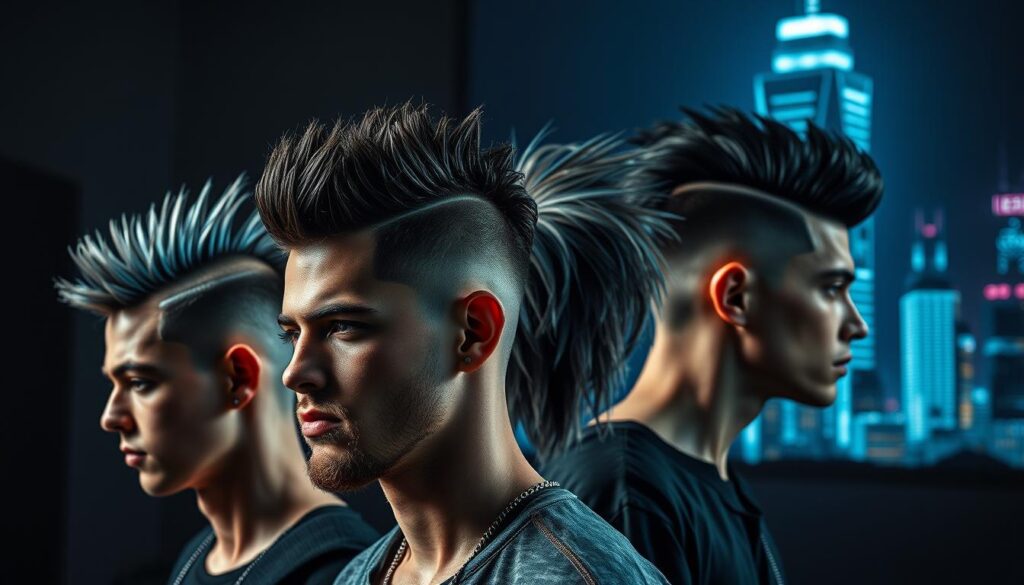
Historical Insights and Cultural Shifts
The 1970s transformed edgy hair into cultural statements. David Bowie’s Ziggy Stardust persona, crafted by stylist Suzi Ronson, turned the mullet into an androgynous art-rock symbol. Jane Fonda’s 1970 shag became her “first hair epiphany,” reshaping public perception overnight. As she later reflected:
“It wasn’t just a cut—it was armor.”
How Trends Evolve in the Salon and Social Media Era
Today’s styles spread faster than ever. Platforms like TikTok and Instagram let trends go global in weeks instead of years. Salons now mix classic techniques with viral inspiration, creating custom looks for every client. For those exploring bold styles, check out this modern take on layered looks.
| Era | Time to Spread | Key Influencers |
|---|---|---|
| Ancient Greece | Centuries | Warriors, poets |
| 1970s | 5-7 years | Rock stars, actors |
| 2020s | 3-6 weeks | Creators, algorithms |
This blend of salon expertise and DIY creativity gives everyone tools to redefine their look. Whether you scroll Pinterest boards or consult professionals, your next style revolution is just a click away.
What Makes the “wolf cut mullet” So Unique?
This isn’t your grandma’s layered look. The style blends 70s rockstar energy with today’s textured layers, creating a shape that’s equal parts fierce and wearable. At its core lies a revolutionary hybrid of shaggy crowns and tapered ends – think lion’s mane meets modern edge.
What sets it apart? The magic happens in the voluminous crown that cascades into feather-soft tips. Stylists use razor-cut techniques to craft uneven layers that mimic natural movement. Unlike rigid styles, these choppy layers bounce with every step, creating that “just rolled out of bed fabulous” vibe.
Three key features define the look:
- Face-framing layers that enhance cheekbones
- Weight distribution that adds body to fine hair
- Customizable lengths for oval, round, or angular faces
| Feature | Traditional Shag | Modern Hybrid |
|---|---|---|
| Volume Placement | Uniform layers | Concentrated crown |
| Styling Time | 15+ minutes | 5-minute scrunch |
| Gender Appeal | Mostly feminine | Universal wearability |
Its secret weapon? The texture-rich system works equally well on pin-straight locks and curly coils. Many opt for modern mullet techniques to amplify their natural wave pattern. Whether you’re heading to the office or a concert, those artfully messy layers transition seamlessly.
What truly makes it stand out is its rule-breaking versatility. It laughs in the face of “too edgy for work” stereotypes while still turning heads at weekend parties. The perfect balance of wild and polished – no wonder it’s taking over salons nationwide.
The Allure and Features of the Wolf Cut
Unlock the power of dynamic layers that redefine modern hairstyling. This bold look thrives on contrast—short, piecey strands up top melt into flowing ends, creating instant volume and movement. The magic lies in its ability to look perfectly imperfect, whether you’re rocking natural curls or sleek straight strands.
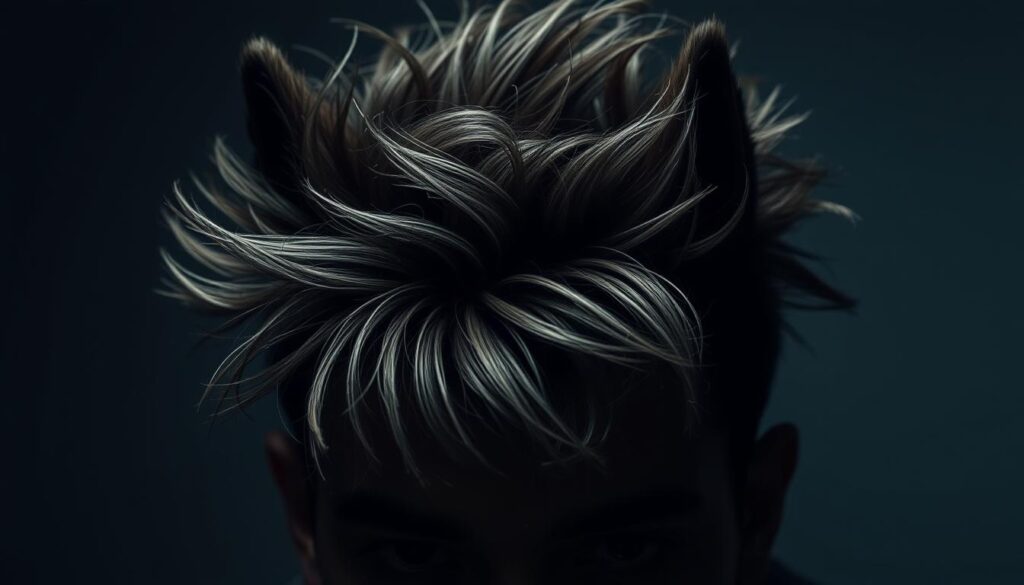
Signature Layers and Voluminous Texture
At the heart of this style lies a three-tiered layering system. Strategically chopped sections at the crown build height, while mid-length pieces soften jawlines. The longest layers graze collarbones, adding swingy dimension. This architecture works wonders for fine hair—it creates the illusion of thickness without heavy products.
| Layer Type | Location | Key Benefit |
|---|---|---|
| Micro-textured | Top section | Creates lift at roots |
| Face-framing | Cheekbone level | Accentuates features |
| Cascade | Below shoulders | Adds fluid movement |
Tips for Maintenance and Effortless Styling
Keep your look fresh with trims every 6-8 weeks—this prevents bottom layers from overpowering the style. For day-to-day care:
- Scrunch damp hair with sea salt spray before air-drying
- Use a diffuser on low heat to enhance natural waves
- Refresh second-day hair with dry shampoo at roots
The real beauty? This texture-rich style looks better when slightly messy. A 30-second tousle with your fingers replaces elaborate styling routines, making it ideal for busy schedules. Whether you’re enhancing curls or going pin-straight, those artful layers adapt effortlessly.
Traditional Mullet Cut: A Revival of Classic Style
From ancient warriors to rock legends, one hairstyle has defied eras with its bold statement. This iconic look traces back to 6th-century BC Greek athletes, evolving into a 1980s rock anthem before landing in modern salons. Its secret? A daring mix of structure and freedom that adapts to every generation’s rebels.
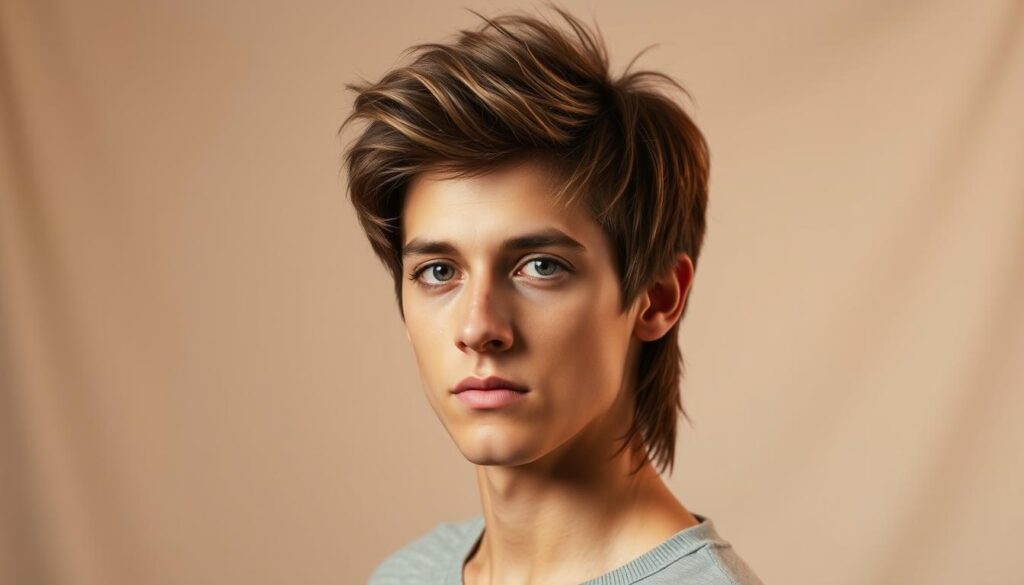
Rock ‘n’ Roll Heritage and Iconic Looks
The 1970s catapulted the mullet into stardom. David Bowie’s flame-red zigzag cut and Joan Jett’s shaggy layers turned heads worldwide. As stylist Chris Connors noted:
“It wasn’t just hair—it was a middle finger to conformity.”
The signature short-front-long-backcontrast lengthsbecame shorthand for artistic rebellion.
| Feature | Classic Mullet | Modern Twist |
|---|---|---|
| Front Length | Ear-skimming | Chin-grazing layers |
| Texture | Teased volume | Natural wave enhancement |
| Styling Time | 30+ minutes | Air-dried simplicity |
Modern Adaptations for Today’s Trendsetters
Today’s versions soften edges without losing spirit. Miley Cyrus pairs curtain bangs with cascading ends, while Doja Cat adds face-framing wisps. The style now works for boardrooms and concerts alike—just ask Zendaya’s red carpet team. Curly-haired wearers embrace diffused volume, proving this cut transcends texture limits.
Salons report 40% more requests for “gentle mullets” since 2022. The key? Customizable contrasts that whisper instead of shout. Whether you channel Bowie’s boldness or prefer subtle nods, this hairstyle remains a canvas for self-reinvention.
Side-by-Side Comparison: Wolf Cut versus Mullet Cut
Choosing between two iconic styles? Let’s break down how these bold looks stack up. Whether you prioritize face-flattering layers or crave a statement-making silhouette, understanding their differences helps nail your perfect match.
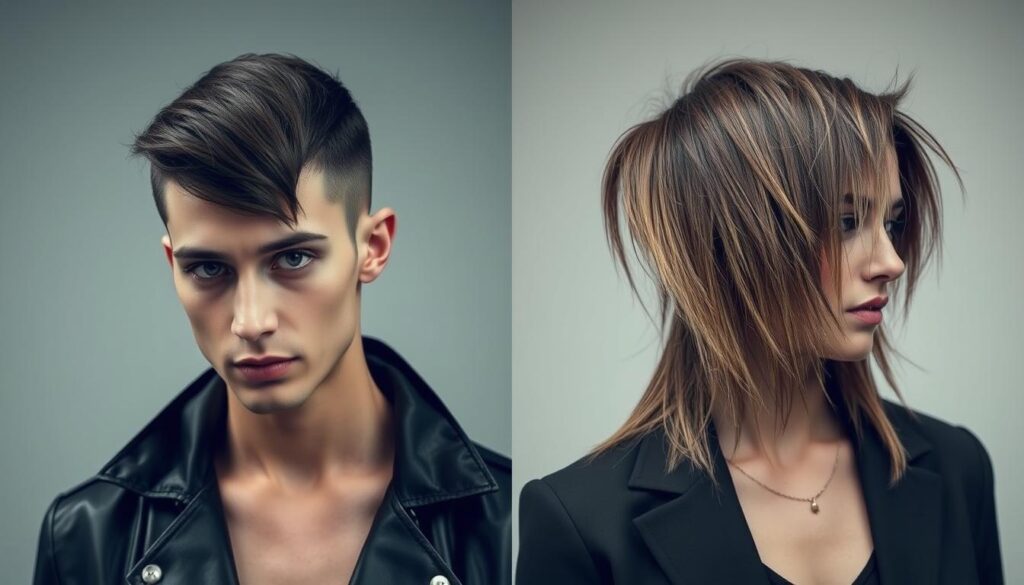
Face Shapes & Hair Types: Finding Your Fit
The right face shape pairing makes all the difference. Those with oval, heart, or round features thrive with wolf cuts—their feathered layers soften angles and create proportional balance. Square and angular face shapes shine with mullets, as the contrast between short sides and longer backs highlights jawlines.
| Style | Ideal Hair Texture | Daily Effort |
|---|---|---|
| Wolf Cut | Thick, wavy, or curly | 2/5 (low) |
| Mullet | All types | 4/5 (moderate-high) |
Curly-haired individuals often prefer wolf cuts for their built-in texture management, while mullets adapt beautifully to straight or fine strands with some product help.
Lifestyle & Self-Expression Through Style
Wolf cuts win for low-maintenance enthusiasts—a quick scrunch with mousse delivers that “I woke up like this” charm. Mullet lovers should budget for bi-monthly trims to keep the iconic length contrast sharp.
- Wolf cut pros: Works with natural hair movement, suits 9-to-5 and weekend vibes
- Mullet perks: Makes a rebellious statement, evolves beautifully with creative styling
Your choice ultimately reflects your personal narrative. Want effortless cool? Go wolf. Crave rockstar energy? The mullet’s your muse.
Choosing the Right Cut for Your Unique Style & Face Shape
Finding your ideal hairstyle starts with understanding your unique features. Your face shape acts like a blueprint—it reveals where to add volume or soften angles for maximum impact. Let’s explore how to match your natural contours with artful layers that elevate your look.
Tailoring Layers to Your Features
Start by identifying your face shape using these quick tips:
- Oval: Balanced proportions with slightly wider cheeks
- Round: Equal width and length with soft curves
- Heart: Broad forehead tapering to narrow chin
| Face Shape | Best Layers | Bangs Option |
|---|---|---|
| Square | Textured ends | Full curtain |
| Diamond | Mid-length layers | Layered curtain |
| Oval | Soft, blended | Wispy curtain |
Face-framing layers work magic for most shapes. For heart-shaped faces, try chin-grazing pieces that balance narrower jaws. Round faces shine with side-swept angles that create elongation.
Your hair type matters too. Thick textures handle choppy layers beautifully, while fine strands need feather-light ends. Curly? Ask your stylist for graduated layers that enhance bounce without bulk.
Consider your daily routine. If you’re always on-the-go, opt for curtain bangs that blend seamlessly with both short and long styles. They add softness without high maintenance—just a quick blowout or air-dry.
Pro tip: Bring inspiration photos to your consultation. As celebrity stylist Jenna Perry advises:
“Great style combines what suits you and what sparks joy.”
Ultimately, your perfect look should feel like you—enhanced. Whether you crave subtle texture or bold dimension, those customized layers will become your signature.
Conclusion
Your hair is your ultimate form of self-expression. The wolf cut mullet offers a bold blend of edgy texture and wearable versatility, proving daring styles can thrive in everyday life. Its artful layers work for coffee runs and concert nights alike—no stuffy salon vibe required.
When choosing a dramatic cut, partner with a stylist who understands your texture and routine. They’ll customize the shape to enhance your natural movement while keeping that signature “I didn’t try too hard” charm. Remember: great hair isn’t about perfection—it’s about confidence.
This wolf cut mullet revolution isn’t just a trend—it’s a permission slip to play. Whether you opt for whisper-soft layers or lioness-level volume, your look becomes a daily declaration of independence. Ready to make the snip that lets your true self shine?
